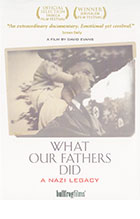
What Our Fathers Did: A Nazi Legacy. A Film by David Evans 2015
Distributed by Bullfrog Films, PO Box 149, Oley, PA 19547; 800-543-FROG (3764)
Produced by Finola Dwyer, Amanda Posey
Director n/a
DVD, color, 92 min.
College - General Adult
Jewish Holocaust 1939-1945, World War II
Date Entered: 03/10/2016
Reviewed by Sheila Intner, Professor Emerita, Graduate School of Library & Information Science, Simmons College GSLIS at Mt. Holyoke, South Hadley, MAHere, in fine detail, is a riveting documentary that demonstrates why we should understand that the Holocaust could happen again—in fact, is happening around the world, even in Galicia, Ukraine, where much of this film is set. Interviews and conversations with the sons of the two highest Nazi officials who governed Galicia during World War II and sent more than a million Jews and Poles to their deaths, reveal their innermost beliefs: one man, that his father was a monster who committed unthinkable crimes; and the other, that his father was not responsible for any deaths.
Who are the central characters? Niklas Frank, son of Hans Frank, Governor General of the Occupied Polish Territories, recognizes his father’s crimes and accepts the fact that his father was responsible for them. Horst von Wachter, son of Otto von Wachter, Governor of Galicia, refuses to admit that his father killed anyone and persists in believing his father to be a decent man who could not save the victims. Philippe Sands is a British human rights lawyer whose grandfather was the only one of 81 Galician family members to survive the Nazi’s Final Solution administered by the fathers of Frank and von Wachter. Sands conducts the interviews, conversations, and events we view and leads Niklas and Horst on a journey to research what happened in Galicia and see evidence that can resolve questions and address the emotional issues affecting all three men.
Both Frank’s and von Wachter’s fathers are fervent Nazis. At the end of the war, Hans Frank is captured and tried at Nuremberg, found guilty, and hanged. Otto von Wachter first hides, then escapes to Rome, where the Vatican protects him from prosecution. He dies a natural death in 1949, though he never regains his freedom or his family.
Although both Niklas and Philippe show Horst unassailable evidence of his father’s crimes, Horst continues to voice the familiar excuses of Holocaust participants: “he himself didn’t kill anyone,” “he had no choice but to follow orders,” “he tried to help the Ukrainians.” In one segment, the three men attend a celebration of the Ukrainian Division—a Waffen SS military group founded by Otto von Wachter during the war to fight the Russians. They are thrilled to meet his son, Horst, and tell him they honor his father. Horst is satisfied and happy hearing members of the group echo his beliefs; but, this reviewer, seeing and hearing it, was horrified a Nazi legacy is still revered.
Technically, the program is outstanding, with carefully captured, well-edited live action footage of Philippe’s conversations with Horst and Niklas in the studio, on their travels, and at events, interspersed with archival film clips and still images that provide context and enrich the presentation. Viewers can see for themselves there are more opinions about who perpetrated the Holocaust than one might think, and they ought not be ignored.